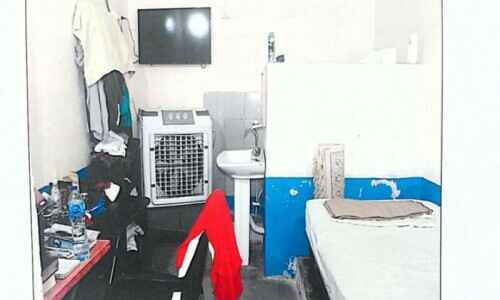ISLAMABAD: PTI leader Imran Khan requested that the Supreme Court order an examination of his prison cell after the federal government provided “pictorial evidence” to refute his claims of being kept in solitary confinement at Adiala Jail.
However, Pakistan’s Chief Justice Qazi Faez Isa noted that the court might designate a judicial person to carry out a covert inspection, although he did not suggest a timeframe.
The five-judge Supreme Court postponed making a decision on Thursday about the federal government’s intra-court appeal of the majority decision from September 15 that declared the National Accountability Ordinance (NAO) amendments unlawful.
Attorney General for Pakistan (AGP) Mansoor Usman Awan informed the Supreme Court at the conclusion of the hearings that the federal government had provided a report that included pictures of Imran Khan’s detention cell. According to the report, which included information on visits from September 20, 2023, to May 30, 2024, Imran Khan saw members of his family, attorneys, and politicians throughout this time.
According to a report provided in light of Imran Khan’s statement during the most recent hearing on May 30, the court has the authority to designate a judicial officer in the form of a commission to confirm the facts as presented before it.
According to the article, Imran Khan’s amenities in jail include an LED television, a room cooler, a study table and chair, books, an exercise bike, an exclusive corridor for twice-daily walks, and a separate kitchen with a menu chosen by him.
SC comments “pained” Imran
Wearing a turquoise shirt, Imran Khan participated in the proceedings for almost thirty minutes via video link from jail. He voiced his displeasure with the Supreme Court’s comments regarding the prohibition on live-streaming this case.
He expressed his grief at the Supreme Court’s statement that he was a dangerous individual who would take advantage of the situation to score points or engage in grandstanding, even though the court rejected the case’s live-stretching.
The court said on June 1 that live-streaming was its only jurisdiction, but it proceeded cautiously to allay fears of exploitation, misuse of the capability for nefarious or private gain, and the potential for grandstanding in front of the public.
The CJP, in response to the former prime minister’s comments, noted that the judges were not present to defend their decisions and urged Mr. Khan to stay on points that were already under appeal rather than veering off course.
Additionally, Justice Aminuddin Khan noted that a decision has already been made about live-streaming.
Imran Khan stated during the hearing that he believed the NAB chairman should be chosen by the Supreme Court in order to prevent misuse of authority and that the NAB law’s amendments were intended to protect “certain leaders.”
misuse of NAB legislation
There was no doubting that the NAB had always been misused against elected officials, but Justice Jamal Khan Mandokhail noted that political leaders, not the courts, should be held accountable for this misuse.
Justice Mandokhail said, “You can come to parliament tomorrow and make a good accountability law.” Imran Khan allegedly made reference to the establishment when he stated that the NAB “always listens to the third umpire.”
Regarding the effects of the NAB law amendments, he expressed sadness that, while NAB recovered Rs295 billion between 2000 and 2017, that amount increased to Rs426 billion between 2017 and 2021. But in 2023, it dropped to a meager Rs300,000, Mr. Khan claimed, lamenting the fact that he was found guilty in three cases in the span of five days.
Justice Mandokhail noted, “The NAB case’s pending status in the Supreme Court was the reason for less recovery.” He asserted that politicians always “mature” in jail. He stated that parliament, not the judiciary, should be in charge of fixing NAB.
Judge Athar Minallah further noted that NAB modifications do not indicate that corruption cases are over; rather, references will be sent to the appropriate courts that are set up in accordance with applicable legislation.
The PTI founder acknowledged during the inquiry that his party ought to address parliament, but he stated that “we boycotted in view of the conspiracies hatched” against them.
He claimed that the largest issue facing the nation was the declining foreign exchange that resulted from the elites’ money laundering to foreign countries with their hard-earned cash.
He also referenced a UN research from 2021 that showed how money laundering had allowed citizens of the developing nations to launder $7 trillion in the West.
If money laundering was a sin, the CJP questioned, then why, during his tenure, did the former prime minister implement amnesty programs across the nation? At this point, Mr. Khan clarified that the purpose of the amnesty program was to “legitimize” the use of black money.
The CJP urged Senator Farooq Naek and PTI’s Faisal Javed to meet together in parliament to find a solution to the problem.
The NAB report, which claimed that Reko Diq had recovered $10 billion, was another item that the court objected to. The APG of the NAB was questioned on the veracity of this claim.
The court even threatened to issue a contempt order for NAB’s $10 billion recovery claim, questioning the agency’s willingness to deliberately deceive the court.
In addition, he requested that the NAB APG refrain from appearing in court going forward and directed the NAB chairman and the prosecutor general to provide a new report that included the NAB’s annual budget as well as a breakdown of its spending over the previous ten years.
Senior lawyer Khawaja Haris Ahmed had earlier wrapped up his remarks.








